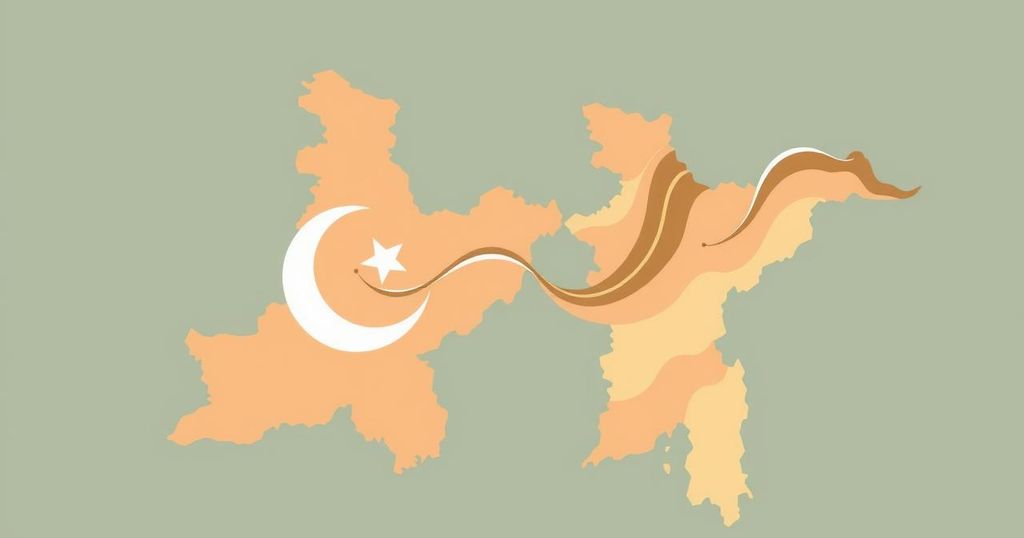Global news
ASIA, BANGLADESH, BANGLADESH NATIONALIST PARTY, BNP, DAR, DHAKA, DIPLOMACY, HINA RABBANI KHAR, INDIA, INFORMATION TECHNOLOGY, INTERNATIONAL RELATIONS, ISLAMABAD, MIDDLE EAST, MINISTRY OF HOME AFFAIRS, PAKISTAN, SECURITY SERVICES DIVISION, SHEIKH HASINA, SHEIKH HASINA WAJID, SYED AHMED MAROOF, THE EXPRESS TRIBUNE
Marcus Li
0 Comments
Pakistan’s Foreign Minister to Visit Bangladesh Amidst Evolving Diplomacy
Pakistan Foreign Minister Ishaq Dar will visit Bangladesh next month, marking a decade since the last visit by a Pakistani official. His trip highlights improving relations post-Hasina’s ouster. Muhammad Yunus, Bangladesh’s interim leader, has accepted an invitation to Pakistan. Strained ties appear to be easing with recent trade improvements and changes in visa regulations. The political atmosphere remains volatile following Hasina’s exile and rising regional tensions.
Pakistan’s Foreign Minister, Ishaq Dar, will visit Bangladesh next month, marking the first visit to the country in over ten years, as reported by The Express Tribune. This visit indicates a potential thaw in relations between Dhaka and Islamabad, especially following the recent political changes in Bangladesh, including the ousting of Prime Minister Sheikh Hasina in August 2024.
Ishaq Dar’s visit, set for February, will be the first by a Pakistani foreign minister since 2012 when Hina Rabbani Khar visited Dhaka to invite then-Prime Minister Sheikh Hasina Wajid to the D-8 summit. Dar confirmed at a news conference in Islamabad that Muhammad Yunus, the chief adviser of Bangladesh’s interim government, will also visit Islamabad on agreed dates.
Diplomatic ties between Pakistan and Bangladesh have been under strain during Hasina’s lengthy tenure as Prime Minister, primarily due to her alignment with India. Reports suggest, however, that relations have improved since her ouster, supported by various high-level exchanges between the two nations.
Additionally, Bangladesh has lifted restrictions on exports from Pakistan, enhancing bilateral trade, which includes the initiation of direct maritime trading routes. During his conference, Dar referred to Bangladesh as a “brother country” and asserted Pakistan’s commitment to supporting Dhaka.
The recent changes in visa procedures—specifically, the removal of the security clearance requirement for Pakistani nationals—could have wider security implications in the region. This liberalization occurred shortly before the Pakistan High Commission’s meeting with Bangladesh Nationalist Party (BNP) leader Khaleda Zia, signaling a shift in political allegiances.
Relations between India and Bangladesh have deteriorated significantly following the political upheaval that led to Hasina’s exile. Concerns have been raised about rising tensions under the interim leadership of Muhammad Yunus, especially in light of social unrest in Bangladesh, including violence against religious minorities, which has further complicated the region’s political dynamics.
In conclusion, the upcoming visit of Pakistan’s Foreign Minister to Bangladesh symbolizes a significant development in diplomatic relations between the two countries. Recent political changes have contributed to improving ties, marked by increased trade cooperation and a shift in visa policies. However, the evolving political landscape and regional tensions warrant careful observation as these nations navigate a complex relationship.
Original Source: www.business-standard.com




Post Comment